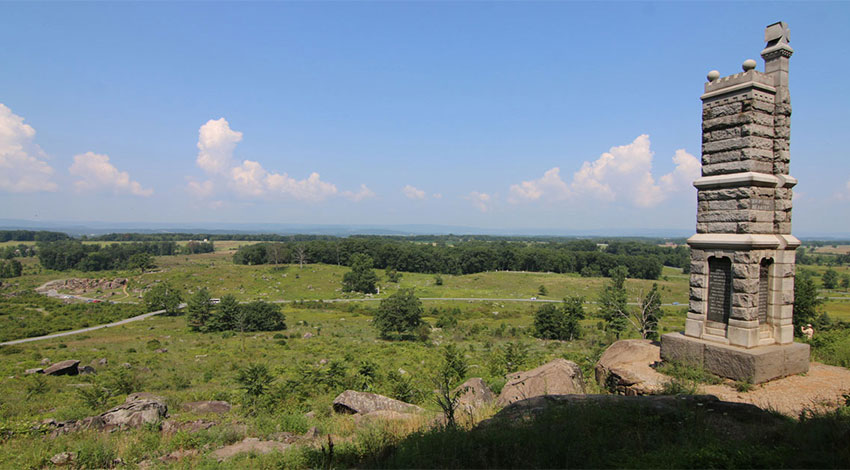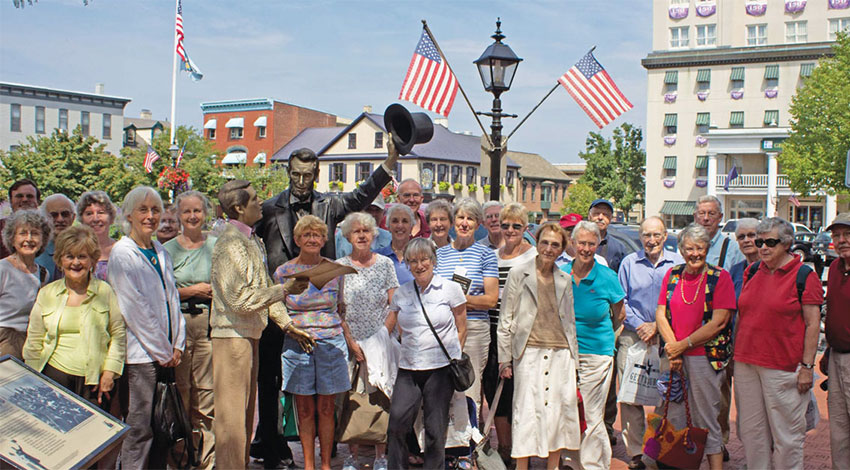A Woman with a Mission: Deb Novotny, the Fourth Female Gettysburg Guide
Road Scholar instructor Deb Novotny’s story begins with the story of another woman—Barbara Schutt. On June 12, 1968, Barbara put down her pencil, sighed, and took one final look at her exam paper before she turned it in. It was a historic day for Gettysburg and a historic day for this trailblazing woman. Barbara passed the test, becoming the first woman Licensed Battlefield Guide at Gettysburg — a position she held for over 20 years.

Barbara passed away in October of 2017. This year we celebrate the 50th anniversary of her accomplishment along with a friend of ours — Deb Novotny. Deb followed in Barbara’s footsteps to become the fourth woman to become a Licensed Battlefield Guide. In the last 50 years since women have been allowed to take the test, there have been 51 female guides, with 17 serving currently. Aside from Barbara’s historic anniversary, Deb also celebrates her own 43rd year as a Licensed Battlefield Guide this year. She has been guiding longer than any other female guide.
We spoke with Deb to hear about what it takes to become a Licensed Battlefield Guide and why she’s so passionate about teaching people about Gettysburg with Road Scholar.

Road Scholar: How did you first become interested in Gettysburg and the Civil War?
Deb Novotny: It all started when I was 10 years old. I had a great 5th grade teacher who really liked American history. It was 1960, and the country was getting ready to celebrate the Centennial of the Civil War, so that’s all you heard about. With those two things happening, I just became fascinated with the Civil War.
After we had a class on Gettysburg, I begged my parents, “Take me to Gettysburg! I want to see Gettysburg!” They planned a day trip just for me. My dad hired an older man — a Licensed Battlefield Guide — who drove with us and told us the story of the battle of Gettysburg over two hours. After that, I said “Wow, I’d like to live in Gettysburg!” My dad told me, “When you grow up, you can move yourself to Gettysburg,” and I did.
Many years later, I found my 5th grade teacher and told her, “You were my inspiration. You set me up for life, and I’ve had a very happy life.”

Road Scholars on the Gettysburg Battlefield
RS: What is the process like to become a Licensed Battlefield Guide?
DN: You have to study on your own, pass the government’s written and oral tests, and then you get a license. In 1972, I took my written test and proceeded to the oral test — which entailed giving a tour to a Park Ranger and another Licensed Battlefield Guide.
I couldn’t take the oral test right away, because they only allowed a certain number of guides at any point in time. You had to wait until somebody quit guiding. I waited three and a half years.
Then, on March 15, 1975, the day I was scheduled to take my oral exam, a blizzard hit Gettysburg. Almost a foot of snow fell on the battlefield. I lived in Western Pennsylvania at the time, so I had already come out to Gettysburg the day before and was staying in a motel. They tried to call my parents to tell me not to come out because the battlefield was closed, but it was too late. I was already there, and I had waited long enough. So, we went out despite the snow, and I passed!

Gettysburg Battlefield
RS: Tell me about the path that led to you becoming a Licensed Battlefield Guide.
DN: You can’t be a guide at Gettysburg without a government license, but you’re not employed by the park. Gettysburg does all the testing to make sure you know what you’re talking about, but you’re self-employed. Though the park is open year-round and guides are available every day, the job is mostly seasonal—from March to November.
After I passed my Licensed Battlefield test, I spent five years teaching American history during the school year in Western Pennsylvania and driving to Gettysburg to guide part time during the summer. When I finished my master’s degree in 1978, I quit my teaching job and came out here to guide full time for the next two years. I ate a lot of spaghetti!
I started substitute teaching in all kinds of subjects. Finally, Gettysburg High School had an opening: 11th grade American history. I applied, had an interview and got the job. I kept it for almost 30 years before I retired to go back to full-time guiding. I have been in seventh heaven from the first moment.
RS: Did you experience any particular challenges or discrimination as a woman in this role?
DN: I had been guiding about five years, when I had a single gentlemen visitor. He looked like he was in the military. The Park Ranger introduced us, and I noticed the way he looked at me, like — what does this woman know about battle? But he didn’t say anything.
I always carry around the map because people can be very visual. I had them color coded —blue for the north and red for the south — and when he saw it, he said “well at least you have the colors right.” I knew exactly what he meant. He was a colonel who graduated from West Point. At West Point, they always showed the U.S. troops in blue and the enemy in red. By the end of that two-hour tour, he had warmed up. He found out this woman knew something about the battle of Gettysburg. The test you have to take is 200 fill-in-the-blank and essay questions. So they make sure you know your stuff!

Civil War Medical Toolkit
RS: Do you tell any stories of women who were involved in the Battle of Gettysburg?
DN: Back in the 90s, I had a women’s college tour, and they wanted women’s stories. So I did some research and came up with some women’s stories. One was about an illegal woman soldier who was found after the third day’s battle. The northerners were burying the dead, and they came upon her body. She was a southerner, but they didn’t know who she was. She had no dog tags. They wrote down that they buried a female in a rebel uniform.
Most of the women’s stories are about the women who took care of the 21,000 wounded. When the armies left, they took their doctors with them. It was weeks before other doctors could come to help. So the women of Gettysburg and women from all over stepped up to care for the wounded.
A woman about 30 years old, Sarah Broadhead, wrote a diary for two months. She wrote that on the fifth day after the battle, after five days of heavy rains, she arrived at a Lutheran seminary that was being used as a hospital to find nearly 100 men badly wounded, laying on the dirt floor of the basement, practically swimming in water. Sarah ran upstairs, grabbed some other ladies, and they dragged them all up to the upper floors. She also said some of them were dying, and they wanted a letter to their loved ones. Those women wrote those letters.
Even if I have all men in the car, I tell Sarah’s story. When most people think of battles, they think of men. We do have a lot of history, but we also have herstory.

A group of Road Scholars in Gettysburg
RS: What’s it like leading Road Scholar groups?
DN: I really like Road Scholars because they are really into it. They’re there because they want to be there. It’s like a classroom. They have good questions. They’re older, and they appreciate history a little better than younger people.
When I lead Road Scholars, the first thing I do is find out where all of them were born and raised. I try to connect something about Gettysburg to where they’re from. You don’t have to give the same tour over and again. It’s similar, but you have different people. It’s like being a rock star — you might sing similar songs each concert, but you have a different audience and you feed off your audience. You have to be flexible to read your audience, and that takes experience too.
Want to experience the Gettysburg Battlefield with Deb?
Check out Road Scholar’s Civil War program in Pennsylvania.
